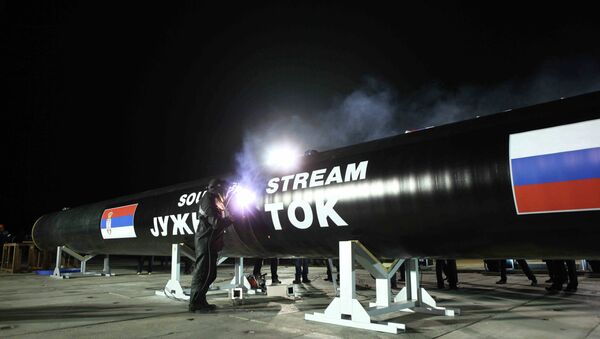Updated 2:52 p.m. Moscow Time
MOSCOW, October 1 (RIA Novosti) – Moscow hopes that work on the South Stream gas pipeline will continue after elections are over in Bulgaria and the European Union renews the European Commission, Russian Deputy Foreign Minister Alexei Meshkov said in an interview with RIA Novosti on Wednesday.
“Work on the South Stream [gas pipeline project] is being conducted in a number of different directions and according preparations are being made for the Bulgarian part. Bulgaria is currently heading for parliamentary elections and the European commissars are about to be changed in the EU. We hope that after all of these changes in the European Union occur, that this work will continue,” Meshkov said.
"We hope that after all of these changes in the European Union occur, that this work will continue," Meshkov added, noting that "the construction of the South Stream [gas pipeline] is a guarantee of energy security in Europe."
The deputy foreign minister said that the opposition of some EU countries to the South Stream project is "100 percent politically motivated."
"I think it's time for everyone to come back down to the ground and occupy themselves with [the] technical aspects [of the project] and I'm sure that this is possible and feasible," Meshkov said.
According to the deputy foreign minister "the South Stream is a complex project, which could contribute to pulling Baltic state economies out of depression."
Russia started building the South Stream gas pipeline across the Black Sea in 2012, aiming to diversify export routes from Russia to central and southern Europe. The pipeline, which will allow the transit of gas to Europe bypassing Ukraine, is expected to be fully operational by 2018. The first gas deliveries are scheduled for late 2015.
Intergovernmental agreements were signed with Bulgaria, Serbia, Hungary, Greece, Slovenia, Austria and Croatia in order to implement the construction of the pipeline's onshore sections. However, in August, Bulgaria suspended operations, saying that they did not meet European Commission requirements.
The commission has long been trying to hamper the project saying it violates the European Union's Third Energy Package, which stipulates that pipelines in the European Union cannot belong to natural gas extractors. Moscow insists that the construction of the pipeline does not contradict the regulations in any way.


